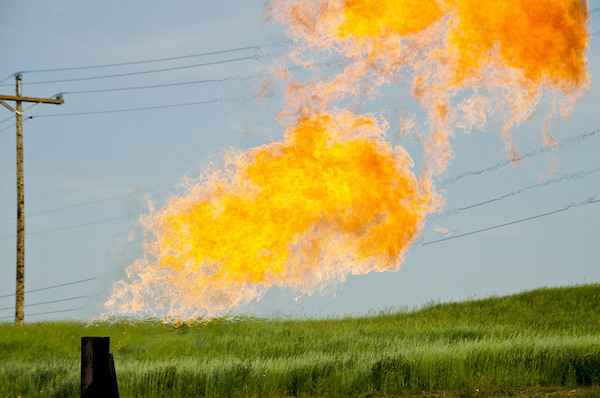SEJournal Online is the digital news magazine of the Society of Environmental Journalists. Learn more about SEJournal Online, including submission, subscription and advertising information.
 |
 |
| The oil and gas industry doesn’t necessarily oppose regulatory controls on methane, since fully capturing the energy source could be profitable. Above, flaring at a natural gas well in McKenzie County, North Dakota. Photo: Tim Evanson via Flickr Creative Commons (CC BY-SA 2.0). |
TipSheet: As Concern Over Methane Mounts, Emission Controls Yield Stories
By Joseph A. Davis
The federal government is cracking down on emissions of methane, an important greenhouse gas. And as those rules tighten, it creates fertile ground for localized methane stories.
In recent months, the U.S. Environmental Protection Agency has advanced one tightened methane rule for oil and gas companies, while the Interior Dept. is proposing another for oil and gas activity on federal lands.
These rules will soon go final and companies will begin feeling their bite.
Why it matters
Methane exerts about 80 times the warming power as carbon dioxide, the greenhouse gas that gets most of the attention. According to the International Energy Agency, methane is responsible for about 30% of the current rise in global temperature.
Not only that, but methane also exacerbates local pollution problems like smog. And the methane that comes out of oil and gas wells is often accompanied by other harmful air pollutants like benzene.
While oil and gas wells are an important
source of methane, it is important to
remember that there are others.
While oil and gas wells are an important — and undercontrolled — source of methane, it is important to remember that there are other significant methane sources. Those include agriculture, confined animal feeding operations, landfills, sewage treatment, coal mines and other sources both natural (e.g., wetlands) and human made.
Methane has been called the “low-hanging fruit” for controlling climate. Amazingly, much of the oil and gas industry is not opposing regulatory control on it. While oil and gas operations still vent and flare a lot of it, capturing it can mean profit for companies.
The backstory
Feeling deja vu about methane regulation? Actually, the Obama administration had already issued methane rules for both public and private lands. The Trump administration abolished them because, well, it was hostile to most federal rules. What Biden agencies are doing is reclaiming that lost ground.
Both of the Biden administration’s beefed-up rules on methane were issued in proposed form, although they may go final during 2023.
Reporters need to know that methane detection devices are within their reach, pricewise. This means that measure-it-yourself stories are possible for even small newsrooms with low budgets.
Simple sniffer devices (often intended for finding leaks at home) go for under $40. It goes up from there. For journalists who may not be able to access a particular emitter’s property, a more expensive laser detector may help measure emissions from a distance.
Story ideas
- Is there oil and gas drilling near you? Is natural gas vented or flared from these sites? How much?
- If gas is vented or flared, what are the obstacles to recovering it? Where are the nearest gathering pipelines?
- If there are gathering lines from your methane source, how old are they? Are they regulated? By whom? Can you get documentation?
- Where are the biggest municipal solid waste landfills in your area? How big are they? Are they old or new? Still accepting waste? Do they collect methane? If not, why not?
- Are there any large confined animal feeding operations in your area? How do they manage manure?
- Ask your local sewage treatment plant how much methane it releases.
Reporting resources
- EPA: A good starting point is the agency’s Global Methane Initiative. The EPA’s Greenhouse Gas Inventory is a good way to find some methane data.
- Bureau of Land Management: The BLM, within the Interior Department, is the main agency overseeing oil and gas leasing on public lands.
- Environmental Defense Fund: The EDF is the environmental group doing the most about methane, even launching its own remote-sensing satellite.
- Climate & Clean Air Coalition: The CCAC is another environmental advocacy group focused on methane.
- Energy Information Administration: The EIA is an agency within the Energy Department that offers independent, reliable information on methane emissions.
- Pipeline and Hazardous Materials Safety Administration: The PHMSA, within the Transportation Department, regulates interstate gas pipelines and some gathering lines.
[Editor’s Note: For more on methane, see our Covering Climate Solutions special report on methane, with a primer on the climate-related problems of methane and the promise of methane-based solutions, along with a reporting toolbox. Also check out Backgrounders on climate change and methane, the cleanup of orphan oil wells, carbon capture and the use of methane as an energy feedstock. In addition, see Reporter’s Toolboxes on a new climate emissions database, a database to track threats from oil and gas wells, and air monitor mapping. Plus, we have Tipsheets on methane leaks at local landfills and natural gas bans, as well as an Inside Story Q&A with a reporter who calls out natural gas proponents. For more climate change resources and news, see our extensive Climate Change Resource Guide, and the latest climate change headlines from EJToday.]
Joseph A. Davis is a freelance writer/editor in Washington, D.C. who has been writing about the environment since 1976. He writes SEJournal Online's TipSheet, Reporter's Toolbox and Issue Backgrounder, and curates SEJ's weekday news headlines service EJToday and @EJTodayNews. Davis also directs SEJ's Freedom of Information Project and writes the WatchDog opinion column.
* From the weekly news magazine SEJournal Online, Vol. 7, No. 44. Content from each new issue of SEJournal Online is available to the public via the SEJournal Online main page. Subscribe to the e-newsletter here. And see past issues of the SEJournal archived here.










 Advertisement
Advertisement 



